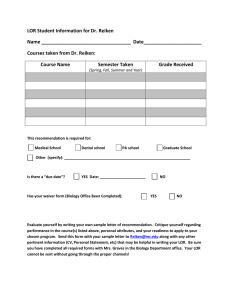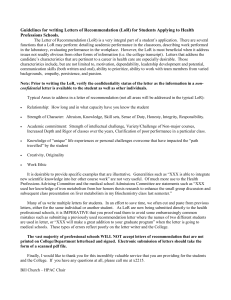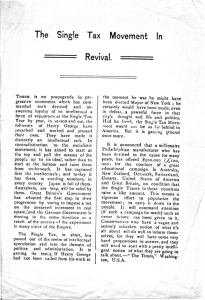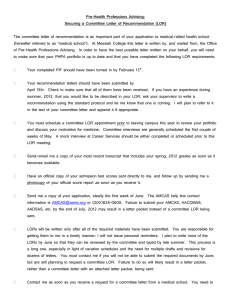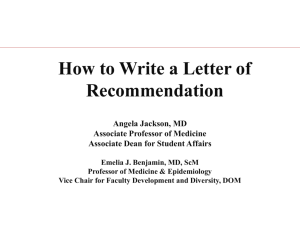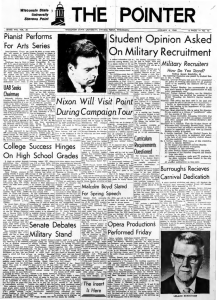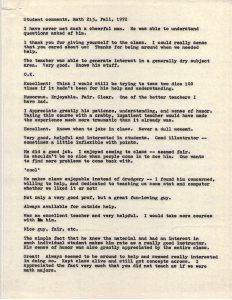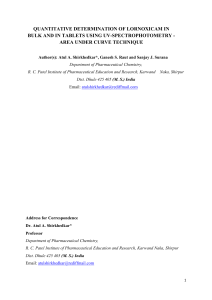Guidelines for Writing Letters of Recommendation
advertisement
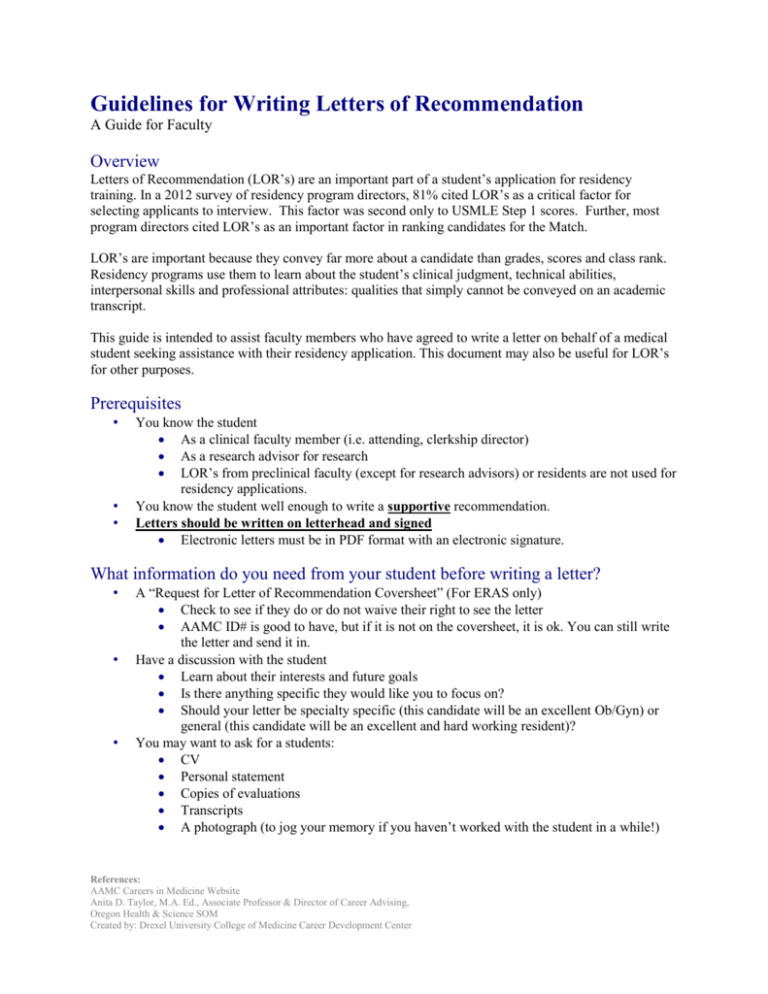
Guidelines for Writing Letters of Recommendation A Guide for Faculty Overview Letters of Recommendation (LOR’s) are an important part of a student’s application for residency training. In a 2012 survey of residency program directors, 81% cited LOR’s as a critical factor for selecting applicants to interview. This factor was second only to USMLE Step 1 scores. Further, most program directors cited LOR’s as an important factor in ranking candidates for the Match. LOR’s are important because they convey far more about a candidate than grades, scores and class rank. Residency programs use them to learn about the student’s clinical judgment, technical abilities, interpersonal skills and professional attributes: qualities that simply cannot be conveyed on an academic transcript. This guide is intended to assist faculty members who have agreed to write a letter on behalf of a medical student seeking assistance with their residency application. This document may also be useful for LOR’s for other purposes. Prerequisites • • • You know the student As a clinical faculty member (i.e. attending, clerkship director) As a research advisor for research LOR’s from preclinical faculty (except for research advisors) or residents are not used for residency applications. You know the student well enough to write a supportive recommendation. Letters should be written on letterhead and signed Electronic letters must be in PDF format with an electronic signature. What information do you need from your student before writing a letter? • • • A “Request for Letter of Recommendation Coversheet” (For ERAS only) Check to see if they do or do not waive their right to see the letter AAMC ID# is good to have, but if it is not on the coversheet, it is ok. You can still write the letter and send it in. Have a discussion with the student Learn about their interests and future goals Is there anything specific they would like you to focus on? Should your letter be specialty specific (this candidate will be an excellent Ob/Gyn) or general (this candidate will be an excellent and hard working resident)? You may want to ask for a students: CV Personal statement Copies of evaluations Transcripts A photograph (to jog your memory if you haven’t worked with the student in a while!) References: AAMC Careers in Medicine Website Anita D. Taylor, M.A. Ed., Associate Professor & Director of Career Advising, Oregon Health & Science SOM Created by: Drexel University College of Medicine Career Development Center • Non-ERAS Programs: the letter requirements for these programs are different and may require you to mail the letters directly to the student or program. The student must provide you with this information. Timing • • • • Tell the student when you will submit the LOR. You and the student should set the deadline together. Email the students once you have submitted the LOR. It is best to write a letter immediately after the student has completed your rotation. Encourage students, especially 4th year Sub-I’s, to let you know early on if they would like a letter from you. You can offer to write a letter for an outstanding student, especially for 3rd years who may not be planning their applications yet. Content of a Letter • • • It is important to include information appropriate to each unique student. We recommend meeting with a student before writing the LOR. Letters should include: Your relationship with the student How long and in what context you know the student Details about student and student performance Potential topics • Student’s potential • Professionalism • Interpersonal and leadership skills • Patient Interactions • Medical Knowledge • Passion for medicine or specialty • Personal Characteristics Specialty specific information Sample Outline of a Typical Letter of Recommendation: Address to: Dear Program Director Opening • Include student name and AAMC ID# • Purpose of letter • Nature and length of your relationship • Your experience in teaching (how often, how many students) • Include in your letter whether or not the student has waived his/her right to see this recommendation. Body • • • Share specific details about the student’s academic performance Fund of knowledge Clinical skills References: AAMC Careers in Medicine Website Anita D. Taylor, M.A. Ed., Associate Professor & Director of Career Advising, Oregon Health & Science SOM Created by: Drexel University College of Medicine Career Development Center • • • • Personal qualities: reliability, hardworking, communications skills, empathy with patients and ability to work as part of medical team Use specific examples Compare the student with others that you have known Closing • • • Reiterate the strength of your overall recommendation Would you recruit this person if you were a residency director? Your signature (may be electronic) When to say No • • • • • You do not know the student well enough You cannot write a strong or supportive letter The student’s timeline is unreasonable for you and your schedule. You are too busy with other commitments Do not say yes if you cannot meet deadline. Missing LOR’s or not having LOR’s submitted on time can cost students their interviews. Where to Send LOR’s • LOR’s can be mailed, sent electronically via email or fax. All must be on letterhead and signed (electronic signatures are acceptable) Mail: Almi Rodriguez College of Medicine Registrar Herbert Wertheim College of Medicine 11200 sw 8th Street AHC2 661 Miami, FL 33199 Fax: 305-348-0650 Attn: Almi Rodriguez Email (in a .pdf format): almrodri@fiu.edu Tips • • • • • Mail signed original if letter was faxed or emailed. Keep an electronic copy so that you can easily updated it in the future for other opportunities Proofread letter – especially the student’s name and gender! Do not reiterate the student’s CV If you feel you cannot write a strong LOR for the student, please tell him/her so that they can find someone who can. References: AAMC Careers in Medicine Website Anita D. Taylor, M.A. Ed., Associate Professor & Director of Career Advising, Oregon Health & Science SOM Created by: Drexel University College of Medicine Career Development Center
